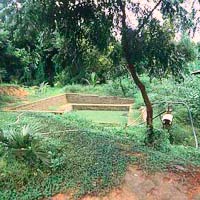Asia & the Pacific
India

- © UNESCO/N.Burke
- Waste water treatment, Auroville, India
The country hosts a UNESCO Cluster Office in New Delhi, which covers India, Bangladesh, Bhutan, Maldives, Nepal and Sri Lanka.
Significant efforts have been made in design, development, field demonstration and large scale use of a number of renewable energy products and systems in India. The Indian programme is today among the world's largest programmes for renewable energy. It is also participating in the Biosphere Reserves Network and in Sustainable Development in Coastal Regions and Small Islands (CSI) projects.
The country is extremely vulnerable to floods, droughts, severe storms, and earthquakes. India is involved in a vast array of earth science projects, including the study of land-ocean interactions during the Quaternary and the study of the geological anatomy of Asia.
Below you can access the projects that are currently being implemented in the country within the framework of UNESCO’s Natural Sciences Sector.
Freshwater
- Hindu Kush HimalayanFlow Regimes from the International Experimental and Network Data (HKH FRIEND)
- Asian Water and Development Information for Arid Lands – A Global Network (Asian G-WADI)
- Asian G-Wadi Pilot Basins: Jaisamand Lake Catchment (Gomti River Basin) and Granite watershed in Krishna-Godavari basin More
People, Biodiversity and Ecology
- Global Change and Mountain Regions (GLOCHAMORE)
- Biosphere Reserves (WNBRs)
- Regional Centre for Biotechnology Training and Education More
Oceans
- UNESCO’s Intergovernmental Oceanographic Commission’s Indian Ocean Tsunami Warning System programme (IOTWS)
Earth Sciences
- Triassic Time and Trans-Panthalassan Correlations (IGCP, Project 467)
- GIS metallogeny of Central Asia (IGCP, Project 473)
- Deltas in the Monsoon Asia-Pacific region (DeltaMAP, IGCP, project 475)
- Monsoon evolution and tectonics-climate linkage in East Asia and its marginal seas during the late Cenozoic (IGCP, Project 476)
- Sustainable Use of Platinum Group Elements (IGCP, Project 479)
- Au-Ag-telluride-selenide deposits (IGCP, Project 486)
- Quaternary Land-Ocean Interactions (IGCP, Project 495)
- Dryland Change: Past, Present, Future (IGCP, Project 500)
- Marine and Non-marine Jurassic: Global correlation and major geological events (IGCP, Project 506)
- Palaeoproterozoic Supercontinents and Global Evolution (IGCP, Project 509)
- Global correlation of A-type granites and related rocks, their mineralization, and significance in lithospheric evolution (IGCP, Project 510)
- Submarine Mass Movements and their Consequences (IGCP, Project 511)
- Neoproterozoic Ice Ages (IGCP, Project 512)
- Fluvial Palaeosystems: Evolution and Mineral Deposits (IGCP, Project 514)
- Geological Anatomy of East and South East Asia (IGCP, Project 516)
Basic Sciences
- Breaking the Poverty Cycle of Women: Empowering Adolescent Girls to Become Agents of Social Transformation in South Asia More
Sciences Policy and Sustainable Development
- Establishing Science and Technology Parks More
Coasts and Small Islands
- Environmental, social and cultural implications of a ship-breaking industry, Alang-Sosia (Gujarat) More
- Mitigating land and water salinity in the Gujarat coastal region More
Renewable and Alternative Energies
- Indian Renewable Energy Programme More

